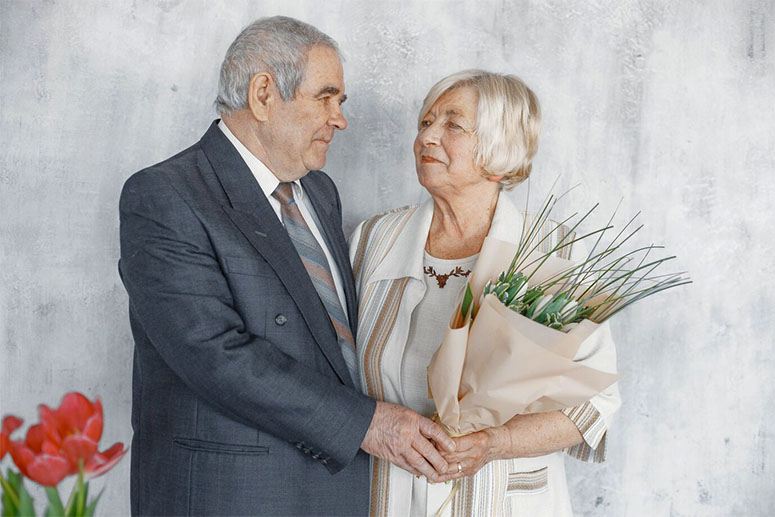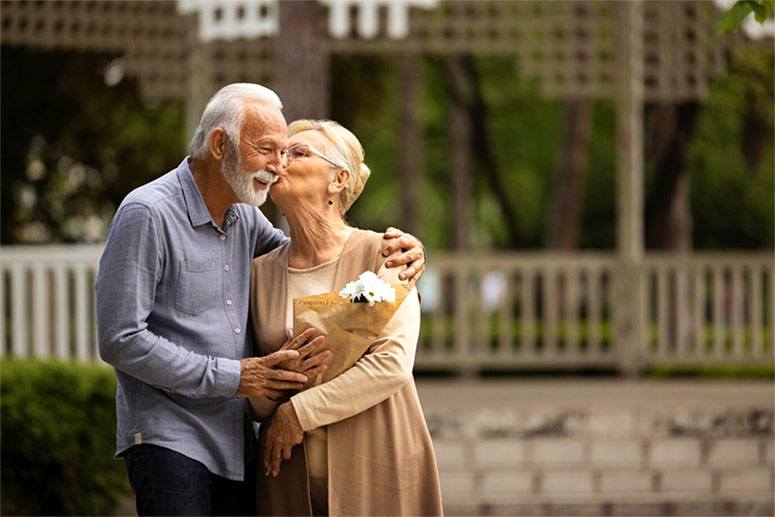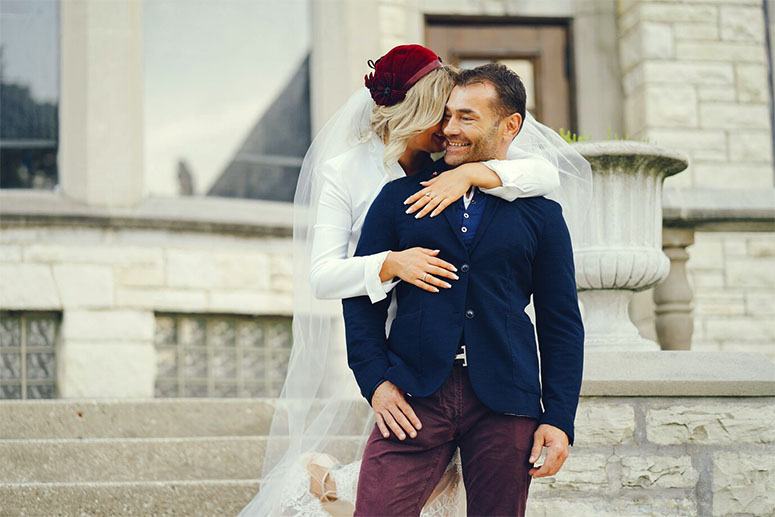Contents
Marriage after 50 is becoming increasingly common, but what do the statistics really tell us? For example, what are the odds of a man getting married after 50?
From the percentage of men and women tying the knot later in life to the growing prevalence of second marriages, understanding these trends can offer valuable insights.
This article explores the reasons people choose to marry after 50, the challenges they face, and practical tips for enhancing the chances of finding love at this stage of life.
Companionship, financial stability, and personal growth play vital roles in this journey.
What are the statistics of marriage after 50?
Marriage after 50 has become increasingly common, with statistics indicating a significant rise in marriage rates among older adults. Recent demographic data shows that individuals in this age group are increasingly opting for late marriages or second marriages.
The evolving societal norms have shifted perceptions around relationship status and the desirability of companionship, leading to a notable increase in marital commitments among men and women over 50.
Moreover, understanding the marriage statistics related to age demographics can provide insights into the changing trends of marriage in the modern era, addressing the factors influencing marriage prospects and relationship goals in later life.
1. Percentage of men getting married after 50
The percentage of men getting married after the age of 50 has seen a notable increase, reflecting shifts in societal attitudes toward marriage and relationship dynamics. So, what are the odds of a man getting married after 50?
In recent years, statistics reveal that approximately 25% of men in this age group are choosing to enter into marital commitments, which highlights a growing acceptance of second marriages and partnerships later in life.
This trend may be influenced by various factors, such as a more dynamic dating culture where online platforms enable individuals to connect more easily.
Emotional readiness among these men often reflects a maturity that stems from life experiences, leading to higher commitment levels than those in their younger years.
Financial stability plays a critical role – many feel more confident in their ability to provide for a partner, resulting in healthier and more fulfilling relationships.
2. Percentage of women getting married after 50
Similarly, the percentage of women getting married after 50 has also increased, showcasing a significant change in marriage trends and the evolving relationship status of older adults.
This shift reflects not only a desire for companionship and emotional support but also a broader societal acceptance of second chances in love and partnership.
Many women in this age group are prioritizing their personal values and shared interests when seeking relationships, understanding that mutual respect and understanding are crucial for a fulfilling bond.
The motivations for these unions often go beyond traditional notions of marriage, as they seek to create a life rich in connection and warmth, fostering relationships that offer stability and joy in their later years.
3. Percentage of second marriages after 50
Statistics on second marriages after 50 reveal a growing trend among older adults seeking new partnerships following previous divorces.
This rise indicates a significant shift in societal attitudes towards love and companionship in later life. Entering a second marriage at this stage comes with its own set of unique challenges.
For many, blending families can be particularly complex, often requiring careful navigation of varied emotional landscapes and established family dynamics. Individuals may find themselves grappling with emotional readiness, as past experiences can influence current expectations.
The divorce rate has reshaped perceptions about the longevity of relationships, leading many to approach remarriage with both excitement and caution, emphasizing the importance of communication and mutual support in fostering long-lasting bonds.
Why do people get married after 50?

People over 50 often pursue marriage for various compelling reasons, ranging from the desire for companionship and emotional support to the pursuit of financial stability and family dynamics.
1. Companionship and emotional support
Companionship and emotional support are primary motivations for individuals getting married after 50, as they seek meaningful connections that enhance their love life.
In this stage of life, many find that emotional intimacy brings a profound sense of security and understanding, crucial for navigating the complexities of aging together.
The partnership thrives on mutual respect and shared experiences, where effective communication skills play a vital role in nurturing this bond.
As they learn to express their needs and listen to each other, emotional intelligence becomes a cornerstone of their relationship, allowing for deeper connections and satisfaction.
Couples who prioritize these elements often report higher levels of happiness and fulfillment, as they cultivate an environment where love can flourish amidst the challenges they may face.
2. Financial stability
Financial stability is another significant factor driving individuals over 50 to marry, as they often seek partners who contribute to shared economic security.
Considering the financial landscape, these individuals are increasingly aware that sharing expenses and pooling resources can lead to a more comfortable lifestyle.
Establishing open lines of communication about money becomes crucial, influencing not only financial decisions but also shaping the dynamics of their relationship.
Support systems, whether from friends, family, or professional advisors, play a vital role in navigating any challenges that arise.
Negotiation skills are also essential – they enable partners to discuss their expectations and reach agreements that resonate with both parties, ultimately fostering a resilient bond.
Enhancing financial stability thus significantly contributes to overall life satisfaction and aligns relationship expectations, creating a solid foundation for a fulfilling partnership.
3. Desire for family and children
Despite being later in life, many individuals getting married after 50 possess a desire for family and connections, which can reignite their hope for love and companionship.
This longing often stems from a rich tapestry of past experiences, where earlier relationships, both romantic and familial, have profoundly influenced their perspectives on love.
Having navigated life’s complexities, these individuals frequently reflect on the significance of emotional bonds, recognizing that deep connections can foster a sense of belonging and fulfillment.
Societal norms increasingly emphasize the importance of companionship during later years, encouraging individuals to seek partnerships that not only provide romance but also the warmth of family ties.
The desire for shared experiences and mutual support becomes a guiding force, prompting many to embrace new relationships as pathways to happiness and continuity.
So, what are the odds of a man getting married after 50?
The increasing percentage reflects a broader trend of older adults seeking meaningful relationships and companionship, showcasing a shift towards valuing personal connections and shared life experiences at this stage of life.
What are the challenges of getting married after 50?

Getting married after 50 presents unique challenges that couples must navigate, including blending families, health issues related to aging, and financial considerations. One common question that arises is, “What are the odds of a man getting married after 50?
1. Blending families and children from previous marriages
One major challenge for those getting married after 50 is blending families and managing relationships with children from previous marriages.
Navigating this shift requires a delicate balance of emotions and expectations, as individuals must address the complexities of their new family dynamics.
Effective communication becomes essential – open discussions about feelings, concerns, and boundaries can help establish mutual understanding.
It is crucial for couples to set realistic expectations, recognizing that relationship building takes time and patience.
Each family member may bring their own history and emotional baggage, making emotional readiness and empathy vital components to foster positive interactions.
Prioritizing family meetings and encouraging inclusivity among all members can further strengthen bonds, promoting a sense of belonging in the blended family.
2. Health issues and aging
Health issues and the realities of aging can pose significant challenges to newly married couples over 50, requiring both partners to navigate these life transitions together.
When considering “What are the odds of a man getting married after 50” it’s important to also think about the impact of health on relationships
As couples embark on this journey, they often confront the emotional toll that health-related concerns can impose on their relationship. The shifts in physical abilities and health can lead to stress, anxiety, and even feelings of isolation.
In this stage of life, it becomes essential for partners to prioritize open communication, fostering an environment where vulnerability is met with empathy and support.
The natural aging process may also affect their intimacy, both emotional and physical, which could create barriers to connection if not addressed.
Understanding and patience are key, as partners learn to adapt to new norms while nurturing their bond.
3. Financial considerations
Financial considerations are crucial in marriages after 50, as couples must address personal priorities and relationship investments to achieve long-term happiness.
This stage of life often brings unique financial challenges, particularly regarding retirement planning and the blending of assets from previous relationships.
As partners navigate these complexities, it’s essential to communicate openly about expectations and financial goals. Joint discussions can aid in aligning their visions for the future, fostering a sense of teamwork that enhances connection.
A solid financial foundation not only mitigates stress but also significantly contributes to relationship longevity.
Couples who take the time to effectively manage their finances together tend to experience greater harmony and security, further solidifying their bond during these transformative years.
How can one increase their chances of getting married after 50?

Increasing the chances of finding a partner and getting married after 50 involves being open to new experiences, taking care of one’s physical and mental health, and ensuring financial independence. Considering “What are the odds of a man getting married after 50” can help frame these efforts in a realistic light.
1. Be open to new experiences and relationships
Being open to new experiences and relationships is essential for individuals over 50 seeking to enhance their chances of marriage.
By stepping outside their comfort zones and trying out various activities, these individuals can discover shared interests and values with potential partners.
Engaging in hobbies, joining clubs, or participating in community events not only broadens social circles but also nurtures a sense of belonging.
This readiness to connect enhances compatibility, making it easier to build deeper, more meaningful relationships.
As they embrace openness, they create space for serendipitous encounters and enriching conversations that pave the way for lasting bonds and mutual understanding, vital components for any successful partnership.
2. Take care of your physical and mental health
Prioritizing physical and mental health is crucial for individuals after 50, as it not only enhances personal happiness but also improves readiness for healthy relationships.
When individuals focus on cultivating a lifestyle that includes regular exercise, balanced nutrition, and mindfulness practices, they create a solid foundation for emotional stability.
This proactive approach to well-being not only helps in managing stress but also fosters a positive self-image, making them more open to meaningful connections.
Engaging in activities that promote relaxation and social interaction can significantly reduce anxiety associated with dating and marriage.
Thus, recognizing the interplay between personal health and relationship satisfaction becomes essential, as it give the power tos people to enter new romantic ventures with confidence and resilience.
3. Be financially independent
Being financially independent is vital for individuals over 50, as it fosters personal confidence and enhances relationship investments in a partnership.
When both partners possess financial stability, it not only reduces stress but also fosters an environment where trust and mutual respect can flourish.
This independence allows each individual to approach the relationship as a partnership of equals, rather than one based on dependence or financial strain.
Consequently, couples are better equipped to navigate commitment issues, as financial concerns often serve as a barrier to intimacy.
Long-term happiness in marriage stems from both partners feeling secure, both emotionally and financially, which in turn nurtures a deeper and more fulfilling connection.
Thus, understanding “What are the odds of a man getting married after 50” can also encourage a focus on building a stable foundation for lasting partnership.
To learn more about the odds of men marrying after 50, see our FAQ section further down.
Embark on a journey through the world of probabilities and unique events. Quench your curiosity and delve into other fascinating topics at WhatAreTheOddsOf.NET.



